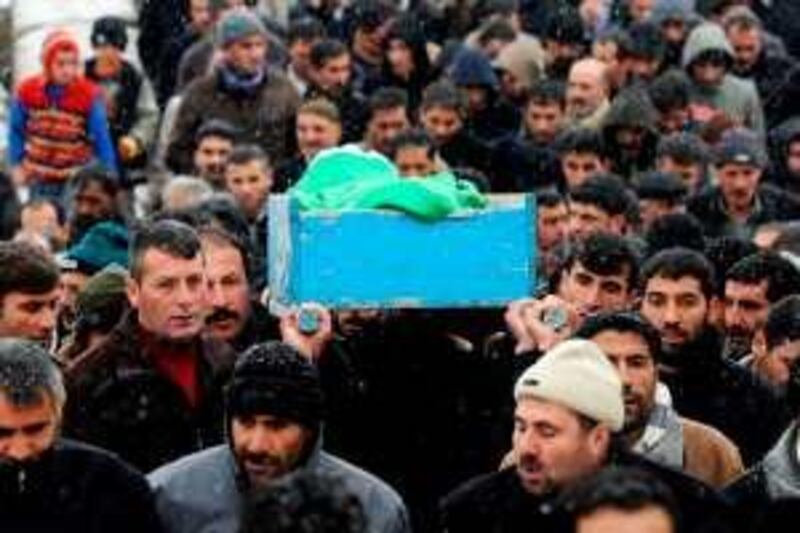ISTANBUL // The Kurdish party is dead. Long live the Kurdish party. Signs with the symbol of the hitherto little-known Party for Peace and Democracy, or BDP, have gone up on office buildings in several towns in Turkey's Kurdish area in recent days. The BDP symbol, an oak tree on a yellow background, replaced that of the Party for a Democratic Society, or DTP, a Kurdish party banned by the constitutional court in Ankara last week.
The BDP, which was formed last year, regards itself as a political lifeboat for DTP officials, members and voters. "We have spoken with the DTP," Demir Celik, the BDP leader, said in a telephone interview from Ankara on Monday. "We are ready to work together." Mr Celik said he disagreed with the court's decision to ban the DTP. His party is expected to hold a congress within three months to formalise co-operation with former DTP members. "We want democratic channels to remain open," he says.
As the BDP signs went up, the DTP leadership said it would withdraw from the national stage for the time being. Meeting in Diyarbakir, the biggest city of the Kurdish region, the DTP decided to pull its 19 remaining deputies from parliament in protest against the ban. The decision has to be approved by the chamber before they are allowed to quit parliament. Meanwhile, street protests that began after the DTP verdict escalated. Two pro-Kurdish demonstrators were shot and killed by a store owner in the eastern city of Mus who said he was defending himself against looters.
Behind the bloody confrontation on the streets and the DTP members' search for a new political home, looms a bigger question, observers say. No matter what party will represent Kurdish nationalism, politicians face the critical decision of whether to distance themselves forever from the use of violence for political aims. The refusal of the DTP to clearly condemn attacks of the Kurdistan Workers' Party, or PKK, a rebel group that has been fighting Ankara for 25 years and is seen as a terrorist organisation by Turkey and the West, was a key reason the court banned the party. Hasim Kilic, the court president, compared the DTP with the Spanish party Herri Batasuna, which was banned because of its closeness to the Basque separatist group Eta.
The European Union, which Turkey wants to join and which has been critical of the ban of the DTP, also said the Kurdish party had not done enough to make clear that it rejected violence. Given the criticism at home and abroad, and the prospect that the BDP may some day also be banned by Ankara if it takes over the DTP's vagueness concerning political violence, Kurdish politicians have to think hard about their new strategy, observers said. "It is weapons or democracy," wrote Taha Akyol, a columnist for the Milliyet newspaper.
Some Kurdish intellectuals have called for a clear-cut stance against violence. "It is obvious that the armed struggle and civilian politics cannot exist together," Orhan Miroglu, a Kurdish writer who was among 37 DTP officials barred from party politics for five years by the court, told the Yeni Safak newspaper. Ali Bulac, a leading Kurdish thinker and columnist for the Zaman newspaper, wrote that Kurdish intellectuals and politicians could see that "Kurds themselves have stopped regarding the 'armed struggle' as helpful and fruitful".
It is not clear if leading Kurdish politicians will choose that road. Ahmet Turk, the leader of the DTP who was stripped of his parliamentary seat by the court, told the CNN-Turk news channel that a PKK attack that left seven Turkish soldiers dead only a few days before the verdict against the DTP had been a "provocation". But Mr Turk, who is considered a dove in the DTP, did not go further than that. Mr Celik, of the BDP, echoed Mr Turk's line. He said the BDP was convinced that "arms and violence are not the way" to solve the Kurdish question, but insisted the DTP had never condoned violence.
Turkish press reports said hawks within the DTP had pushed the party to a position closer to the PKK and were set to put their stamp on the BDP soon. Moderates such as Mr Turk were unlikely to occupy leading positions in the new party, the Taraf newspaper reported yesterday. Even if they are willing, Kurdish politicians promoting more rights for the estimated 10 million to 12 million Kurds in Turkey, will find it hard to separate themselves and their party completely from the PKK. Newspaper commentators pointed out that the DTP had been created after the jailed PKK leader, Abdullah Ocalan, had given the order and even laid down the party's name.
That does not mean the PKK has a political monopoly in the Kurdish area. There are many Kurdish politicians outside the PKK's influence; for example, there are 75 parliamentary deputies of Kurdish descent in the ruling Justice and Development Party, or AKP, of Recep Tayyip Erdogan, the prime minister. But the AKP regards itself as a conservative party, not as a representative of the Kurds. In circles of Kurdish nationalism, following a course independent of the PKK has usually resulted in severe pressure from the rebels. In the 25 years since it took up arms, the rebels defeated other Kurdish groups and established themselves as a powerful player in south-eastern Anatolia, using violence and intimidation, Yilmaz Akinci, an economist working in the Kurdish area, said by telephone.






